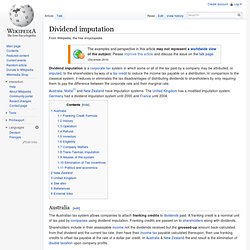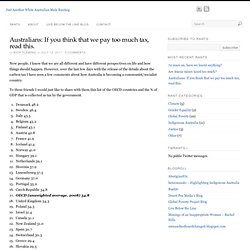

Global Closet Calculator. TradingEconomics.com - Economic Data for 196 Countries. Australian Bureau of Statistics. Economic Statistics. 12 Countries With The Highest & Lowest Tax Rates. Seemingly everyone has an opinion about taxes.

As one of the largest economic and political issues of any country, the subject of how high taxes are (and upon which segment of society they predominantly fall) can be counted on to engender heated debates among politicians, academics, and ordinary citizens. However, beneath all the heated rhetoric and opinions are hard facts and numbers. Certain tax rates in certain countries correlate with certain outcomes, regardless of whether these are acknowledged by various strains of financial opinion.
Today, Business Pundit takes an honest look at twelve countries – six with the highest tax rates, and six with the lowest – and examines other facets of those economies with an eye toward possible correlations. Naturally, there are several different ways to assess the income tax burden a nation imposes – the lowest rate of income tax in a country, the highest rate, income tax on corporations, and the like. Dividend imputation.
Australia, Malta[1] and New Zealand have imputation systems.

The United Kingdom has a modified imputation system. Germany had a dividend imputation system until 2000 and France until 2004. Australia[edit] The Australian tax system allows companies to attach franking credits to dividends paid. A franking credit is a nominal unit of tax paid by companies using dividend imputation. Shareholders include in their assessable income not the dividends received but the grossed-up amount back-calculated from that dividend and the current tax rate, then have their income tax payable calculated thereupon, then use franking credits to offset tax payable at the rate of a dollar per credit.
Franking Credit Formula[edit] Div * tc / (1 - tc) * fp * tc = company tax rate. * fp = franking proportion. For a company that pays tax on all its income in Australia, the franking proportion is usually 100% (or 1.0). History[edit] Operation[edit] The present operation of the system is as follows. Refund[edit] Or who. Debunking the myths of corporate tax. “In this world,” Benjamin Franklin famously declared, “nothing can be said to be certain, except death and taxes.” A few hundred years on, corporate Australia seems hell-bent on making a liar out of him. Picture: Peter Nicholson. Death is still holding out -so no need to fear a business-suited army of the undead just yet—but the taxman has well and truly been given the slip, with billions of dollars from the public purse funneled through loopholes, lurks and perks.
Treasury figures have revealed that over the last decade more than half of all companies paid less than five per cent of their total income in tax: a far cry from the hefty amount individual taxpayers are slugged. And it’s a situation most ordinary Australian’s aren’t too happy about, if the Auspoll data released today is anything to go by.
“The list of corporate welfare tax subsidies published annually by Treasury goes on and on,” Professor Krever says. : Get The Punch in your inbox every day. Australians: If you think that we pay too much tax, read this. Now people, I know that we are all different and have different perspectives on life and how things should happen.

However, over the last few days with the release of the details about the carbon tax I have seen a few comments about how Australia is becoming a communist/socialist country. To these friends I would just like to share with them this list of the OECD countries and the % of GDP that is collected as tax by the government. Denmark 48.2Sweden 46.4Italy 43.5Belgium 43.2Finland 43.1Austria 42.8France 41.9Iceland 41.4Norway 41.0Hungary 39.1Netherlands 39.1Slovenia 37.9Luxembourg 37.5Germany 37.0Portugal 35.2Czech Republic 34.8OECD (unweighted average, 2008) 34.8 United Kingdom 34.3Poland 34.3Israel 31.4Canada 31.1New Zealand 31.0Spain 30.7Switzerland 30.3Greece 29.4Slovakia 29.3Japan 28.1Ireland 27.8Australia 27.1 Only Korea, Turkey, US and Mexico is below Australia in the OECD.
2012–13 Commonwealth Budget - Overview.